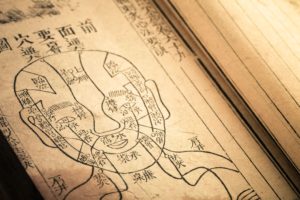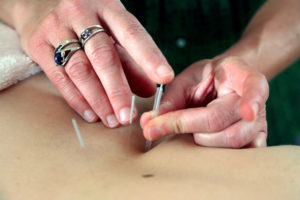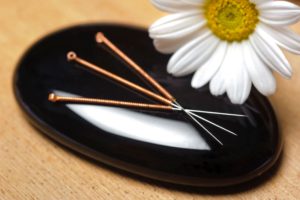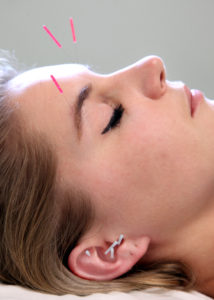What is acupuncture?
Acupuncture is one part of a comprehensive medical system called Traditional Chinese Medicine (TCM), and is a safe and effective medical procedure with minimal risks when performed by a licensed and accredited acupuncturist.
The Latin word “acus” means needle. Acupuncture needles are a FDA approved, Class II medical device, labeled for single use only, and are sterilized, hair thin, and flexible. Unlike hypodermic needles, there is no hole in the needle and no syringe is attached. Nothing is injected or withdrawn. They are made from stainless steel (sometimes gold or silver needles are used).
Acupuncture needles are gently inserted through the skin at specific points along pathways or meridians, and are generally retained for 15 to 30 minutes while the patient rests. Acupuncture needles are not inserted into nerves, by the way, as some people imagine. Believe it or not, acupuncture is very relaxing; often patients fall asleep or doze during their treatments.
What is a meridian?

Traditional Chinese Medicine references “meridians,” which are pathways or channels that are connected to each other within a closed circulation system. When a patient is in good health, the meridians are filled with an abundant amount of blood and qi. Overuse and overexertion will diminish the amount and flow of qi and blood.
There are approximately 365 acupuncture points on the body, located in 20 “regular” and “extraordinary” meridians, which course the body along the limbs, head, trunk, neck, back, hands and feet. They are said to be located just under the surface of the skin at the depth of the hair follicle. Although we cannot see a meridian, all cultures that practice acupuncture agree regarding location of the meridians and the points along the meridians. The meridians have been recorded and historically preserved through diagrams and writings for 100’s of centuries.
What is qi?
 Qi is Chinese for energy! Many cultures use different words to describe the body’s energy. Qi (pronounced “chee”) refers to this vital life energy. This energy, or qi, circulates within the body’s meridians and allows us to move our limbs, digest food, breathe, circulate blood, form coherent speech, warm ourselves up/cool ourselves down, sense movement and feel emotions, to name a few examples of qi’s function in our bodies.
Qi is Chinese for energy! Many cultures use different words to describe the body’s energy. Qi (pronounced “chee”) refers to this vital life energy. This energy, or qi, circulates within the body’s meridians and allows us to move our limbs, digest food, breathe, circulate blood, form coherent speech, warm ourselves up/cool ourselves down, sense movement and feel emotions, to name a few examples of qi’s function in our bodies.
Qi can also be observed outside of us, in the forces of nature. It is the warmth of the sunshine, or the power of a thunderclap. Qi is in the air that we breathe and the food that we eat.
Qi sustains our lives and permeates all of our existence. In good health, qi ideally, flows freely through the meridians that course our bodies. When the flow of qi is impaired, pain and a myriad of other symptoms can appear. One of the goals in acupuncture and Traditional Chinese Medicine is to restore the flow of qi through the body as naturally as water flowing in a brook.
There is a “statement of fact” in Traditional Chinese Medicine: “Mai luo zhong qi xue bu he ze tong.” This translates to: “if qi and blood are not harmonious within the vessels and the connecting vessels, there is pain.”
How does TCM acupuncture work?
 When an acupuncturist inserts a needle into an acupuncture point on the selected meridian(s) they are using their qi and intention as a healer to access and guide the qi of their patient. Using an acupuncture needle to open a point on a meridian is like using a key to open a lock on a gate. I work very gently with patients, informing them as I go along as to what I am about to do next so one will feel comfortable and at ease, knowing what to expect at each insertion. My favorite question is: “Is it in yet?”
When an acupuncturist inserts a needle into an acupuncture point on the selected meridian(s) they are using their qi and intention as a healer to access and guide the qi of their patient. Using an acupuncture needle to open a point on a meridian is like using a key to open a lock on a gate. I work very gently with patients, informing them as I go along as to what I am about to do next so one will feel comfortable and at ease, knowing what to expect at each insertion. My favorite question is: “Is it in yet?”
Acupuncture works by moving blood and qi. When blood moves, circulation improves. When qi moves, pain is relieved. When a combination of acupuncture points are appropriately selected by a trained TCM acupuncturist, we are using a complex system of TCM Differiential Diagnosis (gained through observation of your tongue, your pulse, and the collection of your specific symptoms gained from your health history and initial intake). That is why patients will often report that within a few treatments, other lesser symptoms/complaints the patient has learned to live with, are improved as well! This is because the whole body and all of its processes are being affected by acupuncture.

How does TCM Work in Biomedical Terms?
 Acupuncture is the most common treatment modality that is used within the system of medicine known as Traditional Chinese Medicine (TCM). Most evidence suggests that acupuncture modulates neurotransmitters, cytokines, and neuro-peptides through electro-physiological changes (physiological studies on the relationship between electric phenomena and bodily processes) within the nervous system. This allows interaction with various parts of the brain, the deep limbic system, and the autonomic nervous system via the stimulation of afferent peripheral muscle fibers.
Acupuncture is the most common treatment modality that is used within the system of medicine known as Traditional Chinese Medicine (TCM). Most evidence suggests that acupuncture modulates neurotransmitters, cytokines, and neuro-peptides through electro-physiological changes (physiological studies on the relationship between electric phenomena and bodily processes) within the nervous system. This allows interaction with various parts of the brain, the deep limbic system, and the autonomic nervous system via the stimulation of afferent peripheral muscle fibers.
In practical terms, this means that the placement of acupuncture needles into specific points along the body does two things: 1) It relaxes the brain and allows deep communication with the body’s processes such as: sleeping, breathing, eliminating waste, digesting food, hormonal function, (to name a few). This promotes self-regulation within the body. 2) Acupuncture is beneficial to restoring homeostasis (balance) to an individual who is not well, in pain, or has inflammatory symptoms. Therefore, as pain and other symptoms are being treated, the whole person is harmonized and balanced by the use of acupuncture and traditional Chinese medicine.
What are the benefits of acupuncture?
Here are some of the many benefits of acupuncture and Traditional Chinese Medicine:
-
- Can increase fertility and chances of conception
-
- Excellent for stess reduction and treats symptoms of depression
-
- Proven for pain relief
-
- Activates anti-inflammatory response
-
- Assists in hormone balancing and reproductive disorders
-
- Effectively treats insomnia
-
- Beneficial in the treatment of respiratory disorders
-
- Can significantly improve autoimmune diseases
-
- Helps resolve gastrointestinal conditions
-
- Strengthens immune function
-
- Helps with joint range of motion and pain reduction caused by arthritis
- Speeds surgical and injury recovery
What does acupuncture treat?
Most people will ask me, “Does acupuncture treat…?”
So, to answer that question I have complied a list endorsed by two national organizations below. According to the National Institute of Health (NIH) and the World Health Organization (WHO), acupuncture has been proven effective in the treatment of a wide variety of medical conditions. Here is a list of conditions that have been effectively treated by acupuncture and Oriental Medicine:
- post operative/
surgical pain - cancer pain
- dental pain/
tooth pain/TMJ - chronic pain of any kind
- carpal tunnel/wrist pain
- shoulder pain/
frozen shoulder - elbow/knee pain
- neck pain/back pain/
low back pain/stiffness - degenerative discs/
complications - facial pain
- sciatica
- sprains
- old injuries
- tendonitis
- trauma/whip lash
- trigeminal neuralgia
- nerve pain
- musculoskeletal pain
- herpes pain/
shingles pain - earache
- sore throat
- fibromyalgia
- headaches/migraine/tension
- joint pain/arthritis/
rheumatoid arthritis/
osteoarthritis - sinus pain
Chemotherapy Assistance
- nausea/vomiting
- fatigue
- depression
- immune system deficiency
- leukopenia
- adverse reactions to radiation/chemotherapy
Cardiac Health
- cardiovascular conditions
- chronic fatigue
- high blood pressure
- palpitations
- anxiety
- stress/tension
Respiratory Health
- allergies
- asthma
- allergic rhinitis
- bronchitis
- pneumonia
- relief of colds/flu/fever
- cough of any kind/
pertussis - snoring
Women’s Issues
- hormone imbalance
- low sex drive
- endometriosis
- infertility
- fertility issues in men/women
- irregular periods/
menstrual irregularities - menopausal symptoms
- painful periods
- PMS
- polycystic ovarian syndrome
Pregnancy Issues
- morning sickness/
nausea/vomiting - pain during pregnancy
- early/mid/late pregnancy issues
- malposition of fetus
- labor induction
- post-partum care
Uro/Genital Problems
- overactive bladder
- cystitis
- urinary tract infection UTI
- water retention
- yeast infection
- prostatitis
- bladder/kidney problems
- painful urination
- incontinence
- impotence
- prolapse
Gastrointestinal Imbalances
- nausea/vomiting
- acid reflux
- bloating
- colitis/ulcerative colitis/
diverticulitis - diarrhea
- constipation
- IBS
- Crohn’s Disease
- dysentary
- indigestion
- gastroporisis
Skin Issues
- excessive bruising
- acne
- hives
- skin itch/rashes/eczema
Other
- depression
- seasonal affective disorder (SAD)
- dizziness/vertigo
- hiccough
- sleep disturbance
- smoking cessation
- vision problems
- poor immunity
- Bell’s Palsy
- drug/alcohol addiction
- circulatory issues
- liver problems
- kidney problems
- Meniere’s Disease
- Raynaud Syndrome
- Stroke Rehabilitation
- stress reduction
- sports injury
- wellness
How long until I feel better?

Return to balance
You should feel better with each visit. A series of treatments to address an injury may be different than treating something you’ve had for a long time, such as a congenital disease or an autoimmune condition. Usually a series of visits is recommended. A typical course of treatment for a certain condition/injury/disease may take, on average, 6 to 8 visits, and again, your response to the treatment will largely depend on the severity of the injury, depth of the disease, the duration of time you’ve had a condition, and your general constitution.
Sometimes your treatment plan can be carried out once a week, or sometimes, if you are in pain, twice a week until there is relief. Your visit schedule will be adjusted as you respond and improve.
Successful relief also depends on the quality of self-care that you practice outside of the acupuncture sessions. Even health problems beyond our control such as accidents, heredity, genetic expression, overwork & stress, or environmental pollution/food additives are benefited by a combination of medical intervention (when necessary) and self care. The focus on traditional Chinese medicine is on the individual, not the disease. The historic intention of TCM is to keep the patient well.
The important thing to remember when you consult a licensed acupuncturist is to find a practitioner in whom you have confidence, and with whom you feel comfortable and supported to make the personal changes that will benefit your body, your mind, and your health.
